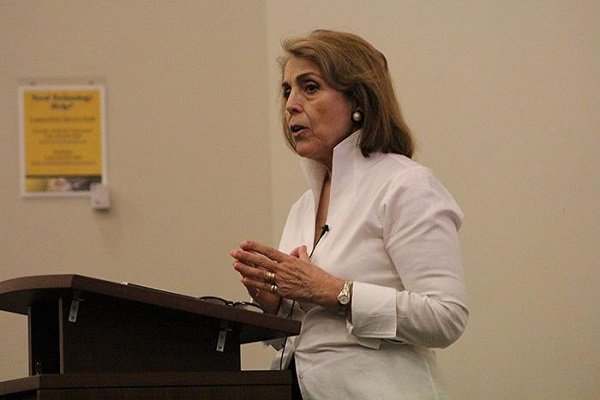Agreement with Iran, increase Trump’s chance to win 2020 presidency: Shireen Hunter

TEHRAN - Shireen Tahmaasb Hunter, a professor of political science at Georgetown University, tells the Tehran Times that “Europe shares U.S. concerns about aspects of Iran's foreign policy, especially regarding the Arab-Israeli conflict and its relations with groups such as Hamas and Hizbollah.”
“If there is no prior agreement on the most contentious issues then talk between President Rouhani and Trump would not able to solve U.S.-Iran problems,” Hunter says.
She adds “Clearly, if Trump manages to reach an agreement with Iran, its electoral chances to win the presidency in 2020 would be enhanced.”
Following is the text of the interview:
Q: What objectives does French President Emanuel Macron pursue in mediation between Iran and the U.S.? Are these efforts made in coordination with Washington?
A: Macron pursues several goals through his mediation efforts. First, his role in reducing Iran-U.S. tensions, if successful, would enhance his prestige domestically and internationally, including within the European Union. France wants to play a leadership role in Europe and this enhanced prestige would enable it to achieve its goals. Second, Macron is genuinely concerned about a potential conflict in the Persian Gulf resulting from U.S.-Iran tensions. Thirdly, France, too, is concerned about what it sees as the shortcomings of the JCPOA in ensuring that Iran sometime in the future would not pursue a nuclear weapons program. Finally, he wants to portray the image of a seasoned and responsible leader in contrast to Trump's erratic and impulsive behavior.
Q: Iranian Foreign Minister Zarif surprise visit to Biarritz (G7 summit) raised the speculation over Iran-U.S. talks. Macron even hoped a meeting between the Iranian President Rouhani and his American counterpart Trump could occur on the sidelines of the UN General Assembly. Was it Macron's personal idea or promoted as a result of his meeting with Zarif?
A: It is hard to say who, Macron or Zarif, suggested the possibility of a meeting between President Rouhani and Trump at the margins of the UN general assembly. But the United Nations' annual session offers the most logical opportunity for such a meeting should it occur. Therefore, both men might have thought of the possibility simultaneously.
Q: In a Joint press conference with his American counterpart, Macron hoped for a new deal with Iran in exchange for more economic benefits. It seems that French President agrees with Trump on a new deal which includes Iran’s missile program as well as sunset provisions and greater access for IAEA inspectors. As these issues are among the Iran red lines, how do you evaluate the prospect of any potential talks between Iran and the U.S.?
A: By and large, Europe shares U.S. concerns about aspects of Iran's foreign policy, especially regarding the Arab-Israeli conflict and its relations with groups such as Hamas and Hizbollah. Anxiety regarding Iran's weapons programs derives from the fact that Europe --and U.S.--fear that Iran might use these weapons to pursue what they consider destabilizing activities in the Middle East. Dispute over Iran's weapons programs have always been more a symptom of these deeper disagreements about regional politics. By contrast, Iran sees its weapons program as defensive and for the purpose of deterrence. If there is no prior agreement on the most contentious issues then talk between President Rouhani and Trump would not able to solve U.S.-Iran problems.
Q: The direct talk with Iran seems to be beneficial for Trump’s reelection campaign. But Rouhani backed off the idea of direct talks, saying Washington must first lift sanctions. What kind of concessions may he offer to convince Iran?
A: Clearly, if Trump manages to reach an agreement with Iran, its electoral chances to win the presidency in 2020 would be enhanced. However, historically with few exceptions, the role of foreign policy in American presidential elections has always been relatively insignificant. Economic concerns and security issues are more important to the so that American people. Therefore, i doubt that Trump would be willing to offer significant concessions to Iran so that he could meet with Rouhani, especially that many in his own government and in congress are against reducing pressure on Iran. Therefore, Iran should not count on the forthcoming presidential elections to obtain concessions from Trump.
Q: Since Trump has a really bad reputation in pulling the U.S. out of international deals, will any potential deal have an executive guarantee? Trump dropped JCPOA despite the fact that it is part of resolution 2231 voted by every member of the UN Security Council?
A: Iran is right in doubting Trump's, or any other U.S. administration's reliability. In general, most states when it comes to their interests ignore their contractual commitments. Lenin's famous saying that "treaties are made to be broken" applies to nearly all states. In the case of the U.S., those agreements that do not pass through the process of ratification by the Senate are the most vulnerable. In general, as long as Iran and the U.S. disagree on basic regional matters, agreements on narrow and specific issues will always be rather fragile. However, as Macron suggested, perhaps a compromise such as Iran returning to enrichment levels mandated by the JCPOA in exchange for America's easing Iran's oil related and some banking restrictions could be both possible and useful.
Leave a Comment